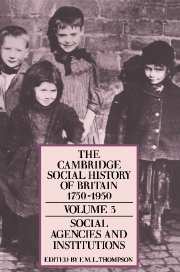Book contents
2 - Society and the state in twentieth-century Britain
Published online by Cambridge University Press: 28 March 2008
Summary
In the chapter on ‘Social Movements’ in Volume 12 of the old Cambridge Modern History published in 1910, Sidney Webb predicted that one of the main characteristics of twentieth-century society would be that it would consist only of government and of private citizens. As democratic rights were extended and as public authorities acquired increasingly extensive powers over social and economic affairs, the great ramshackle mass of private, pluralistic and voluntary institutions that had constituted the fabric of past societies would be progressively displaced by a streamlined, simplified, rationalised two-way relationship between the individual and the state. Seventy years later a distinguished American political scientist, Samuel Beer, diagnosed the relationship between British government and society in the latter half of the twentieth century in diametrically opposite terms: government had acquired greater powers and citizens had acquired greater democratic rights, but these trends had been accompanied by a proliferation of pluralistic interest groups unprecedented in British history. The upshot was that both government and individuals were in many ways more impotent than they had been under the traditional, restricted, imperfectly democratic system that had prevailed earlier in the century.
Curiously enough, though apparently the antithesis of each other, both the predictions of Sidney Webb and the historical diagnosis of Professor Beer contain important elements of historical truth. They both capture genuine elements in the immensely complex and continually changing relationship between British government and society in the twentieth century. This pattern of change to a certain extent reflects global rather than purely national history – the pressures of war, industrialisation, ideological dissent and demographic growth that have remodelled government institutions in all advanced countries.
- Type
- Chapter
- Information
- The Cambridge Social History of Britain, 1750–1950 , pp. 63 - 118Publisher: Cambridge University PressPrint publication year: 1990
References
- 18
- Cited by

